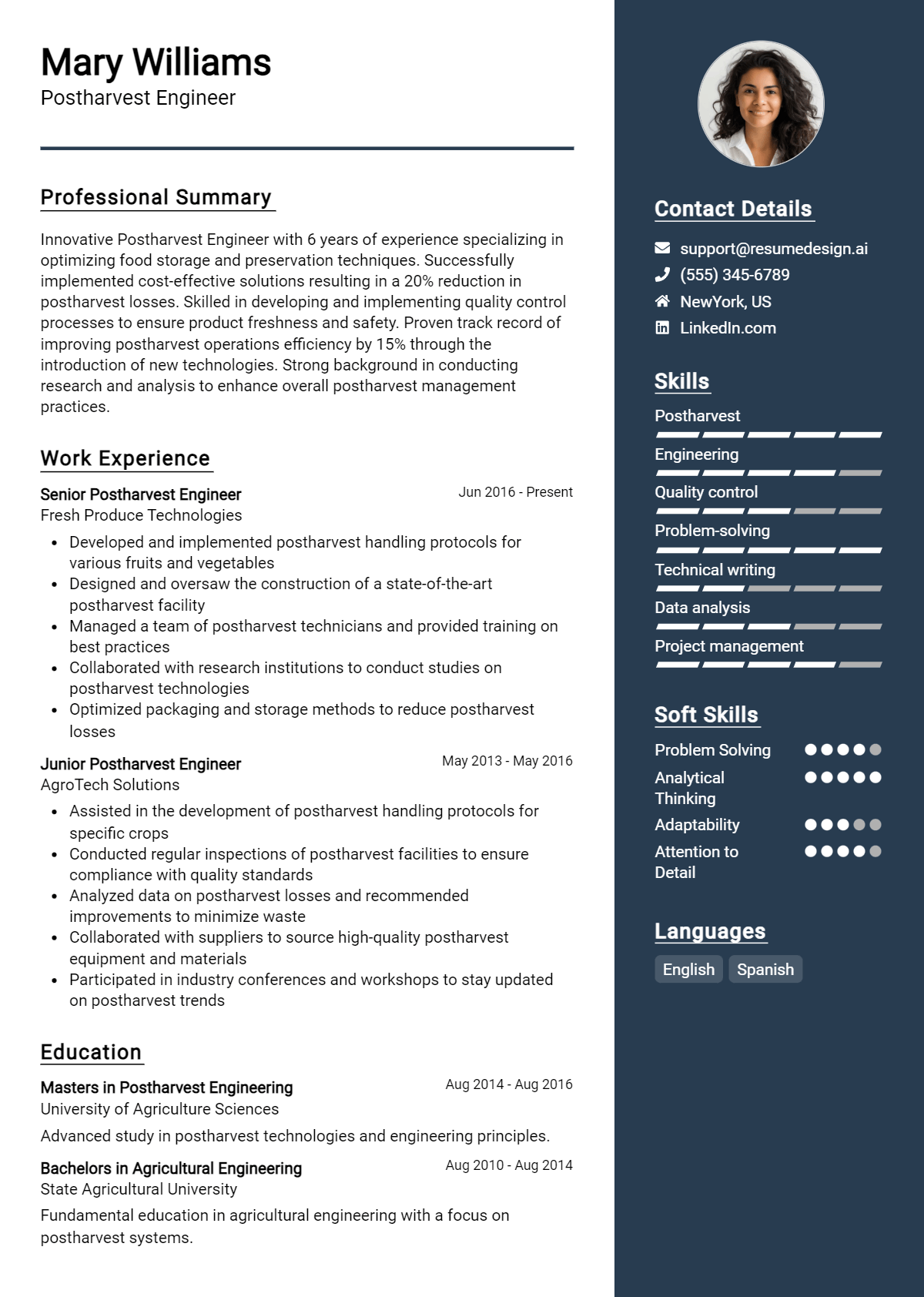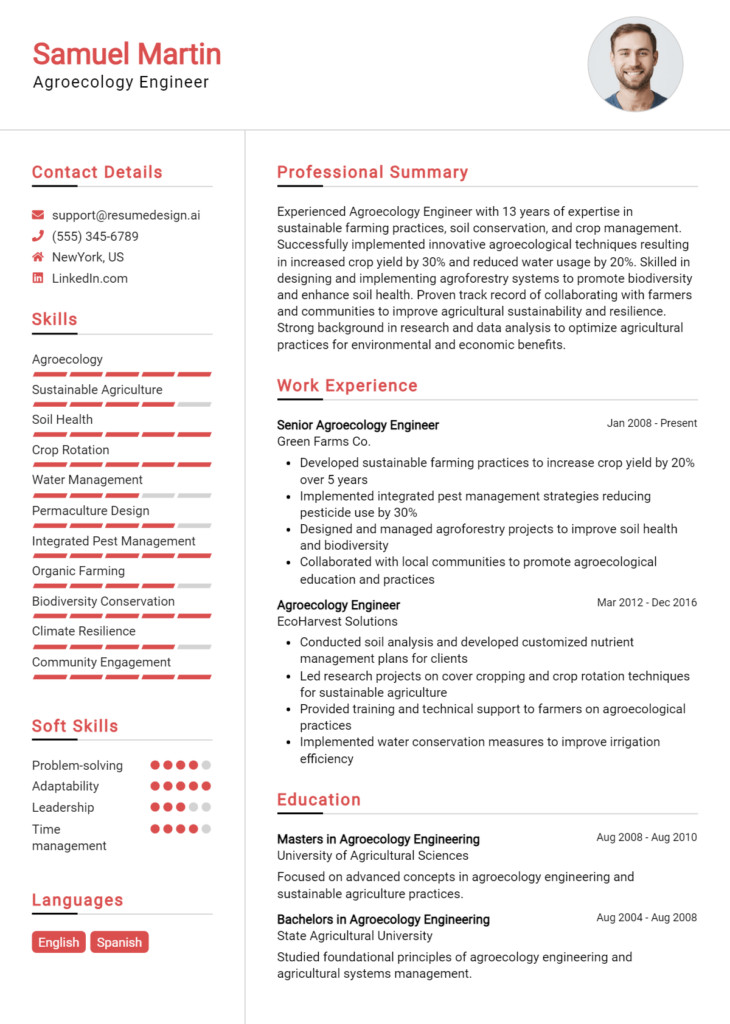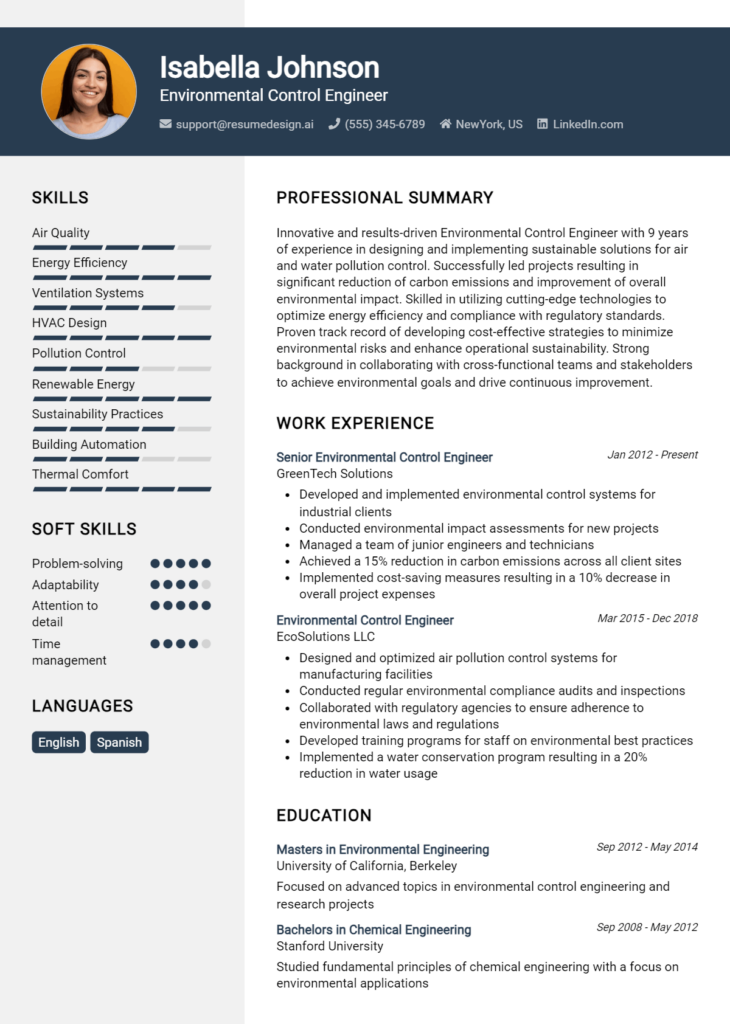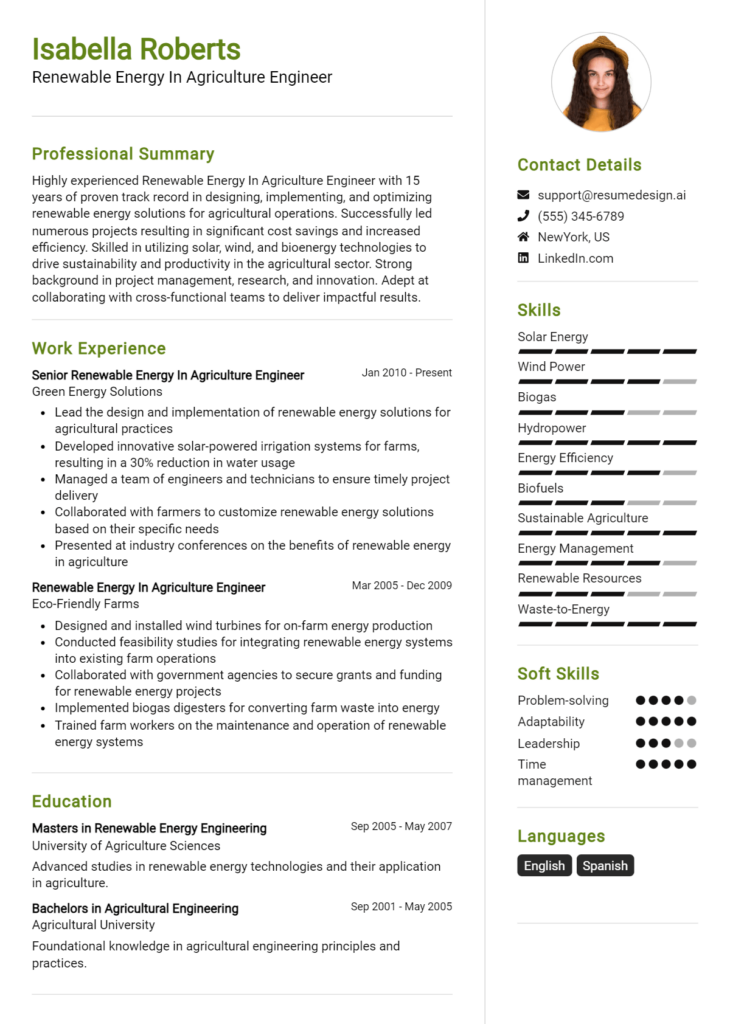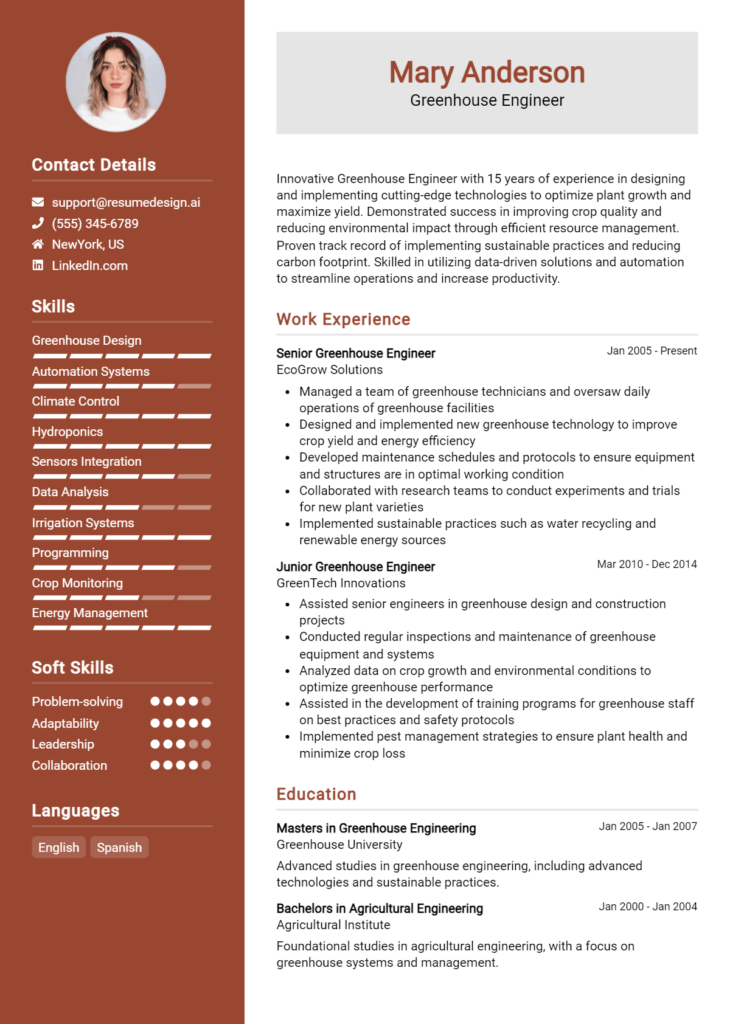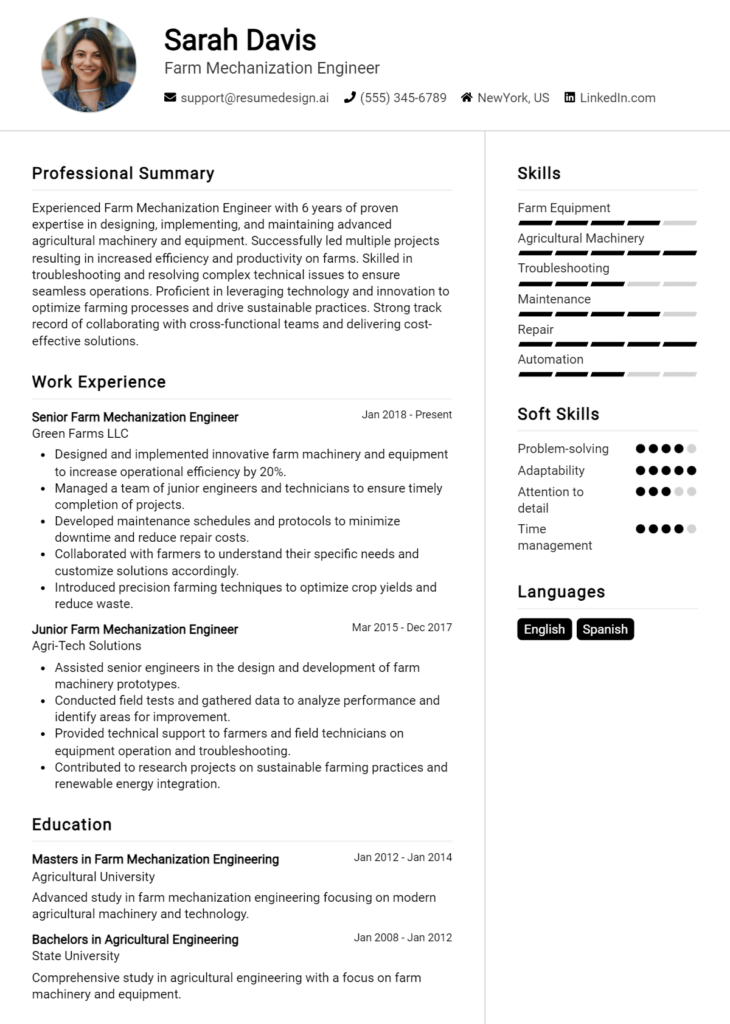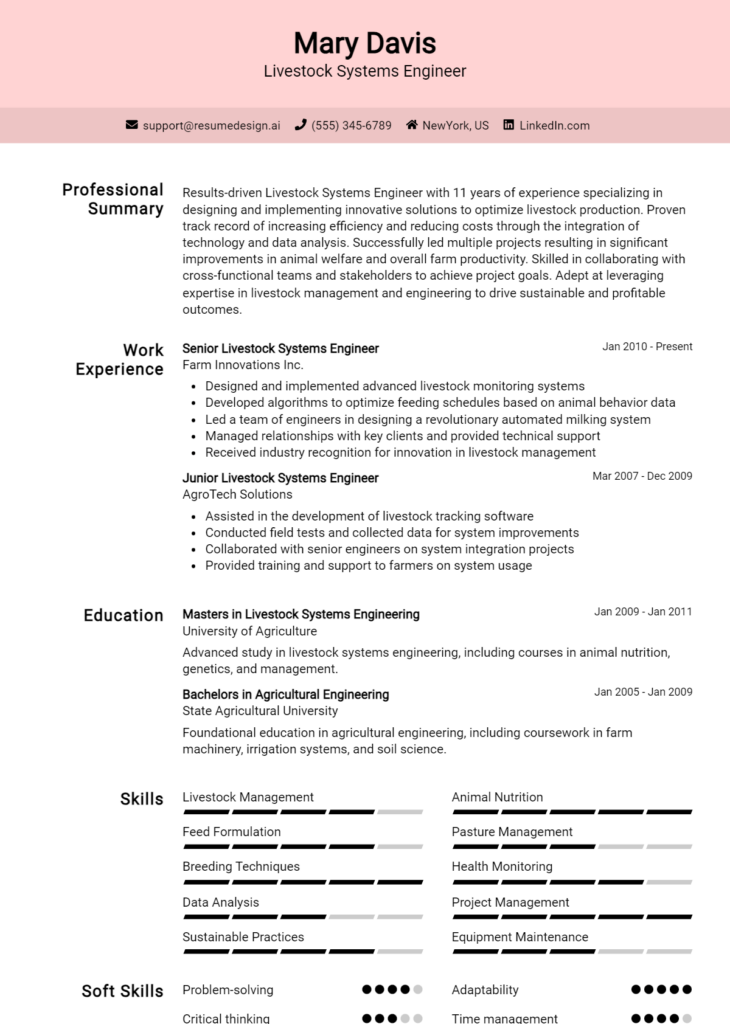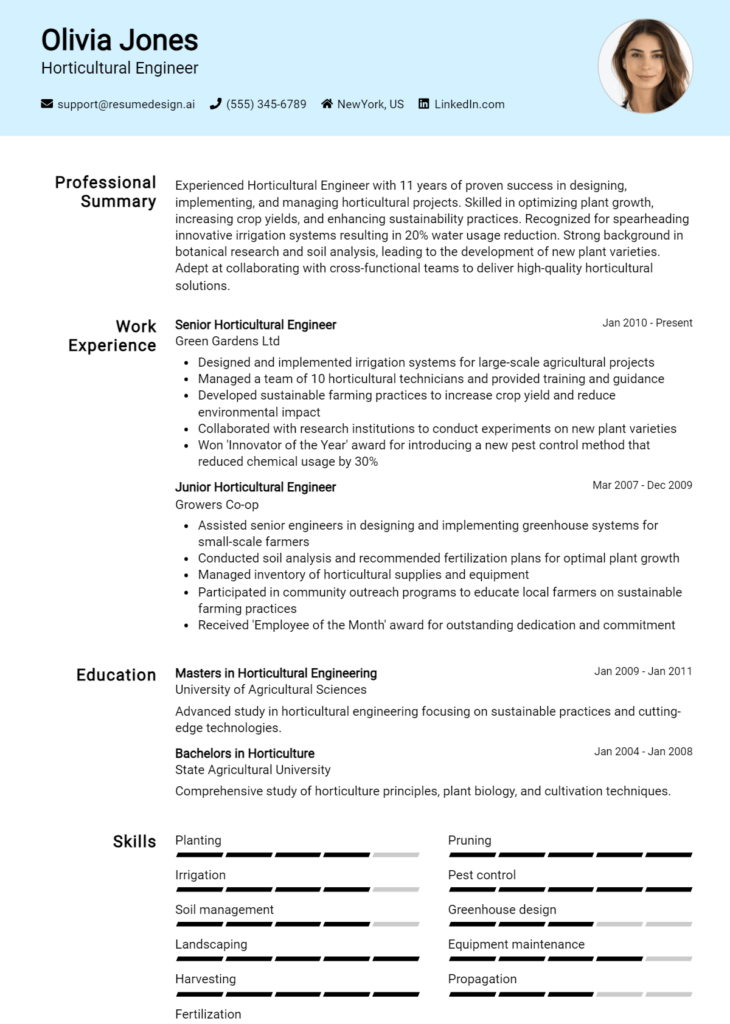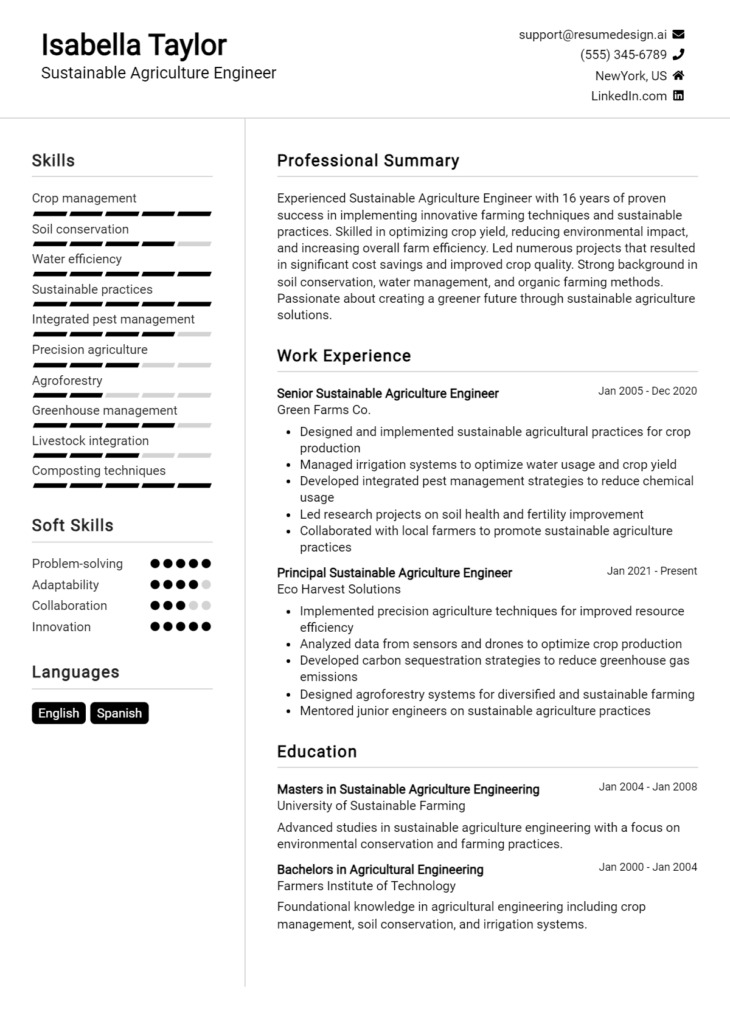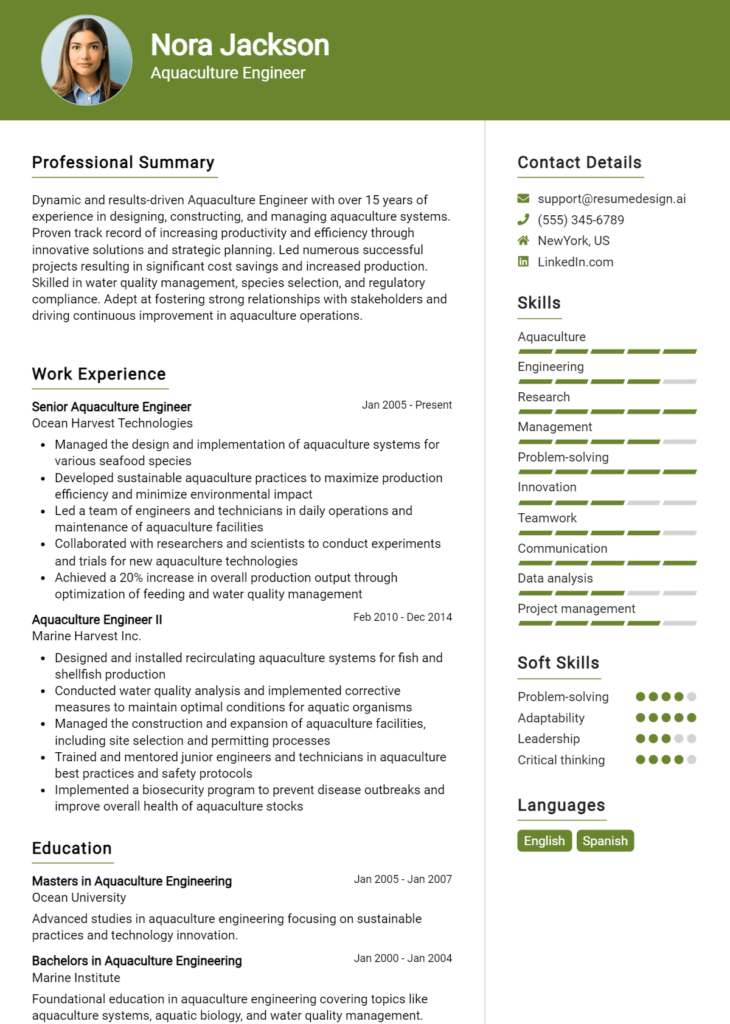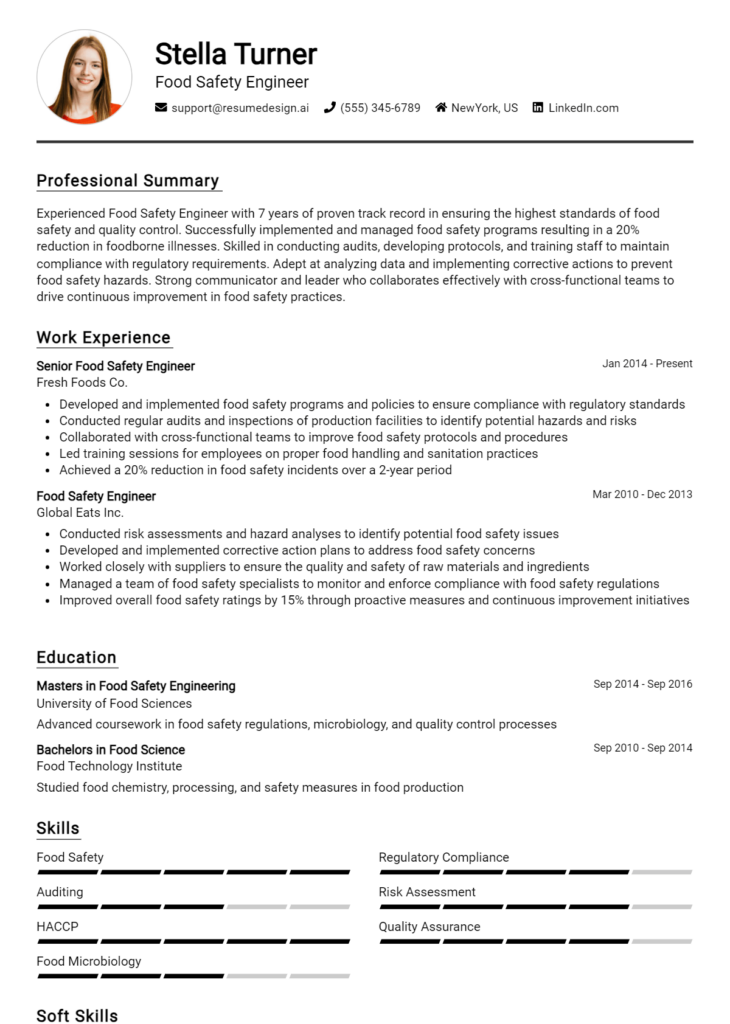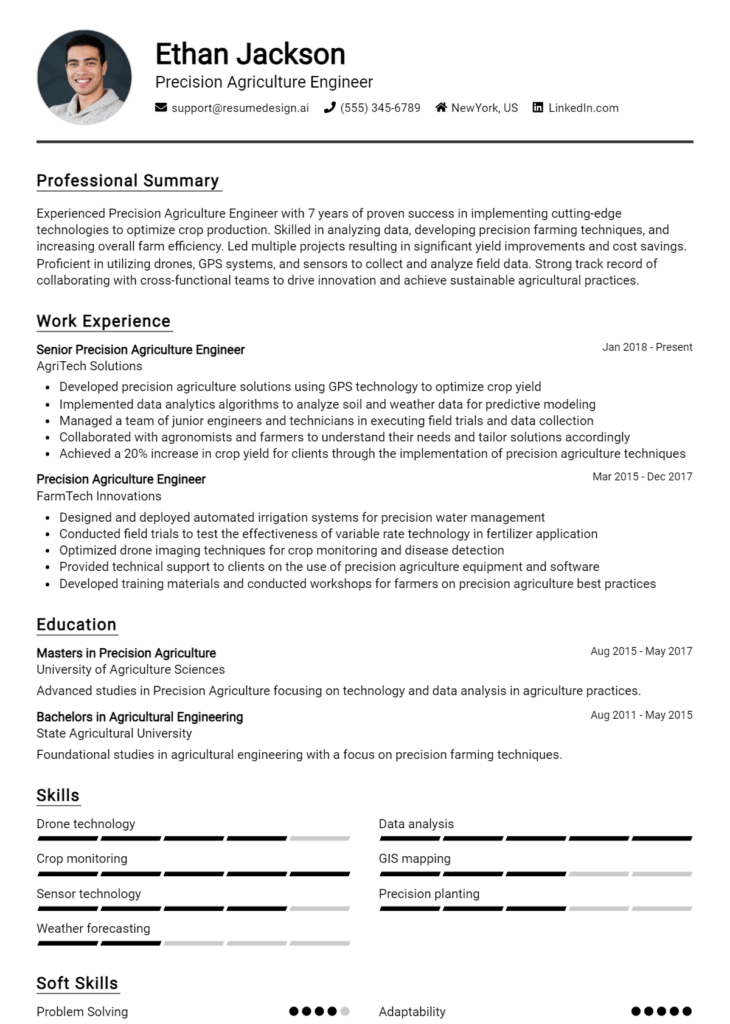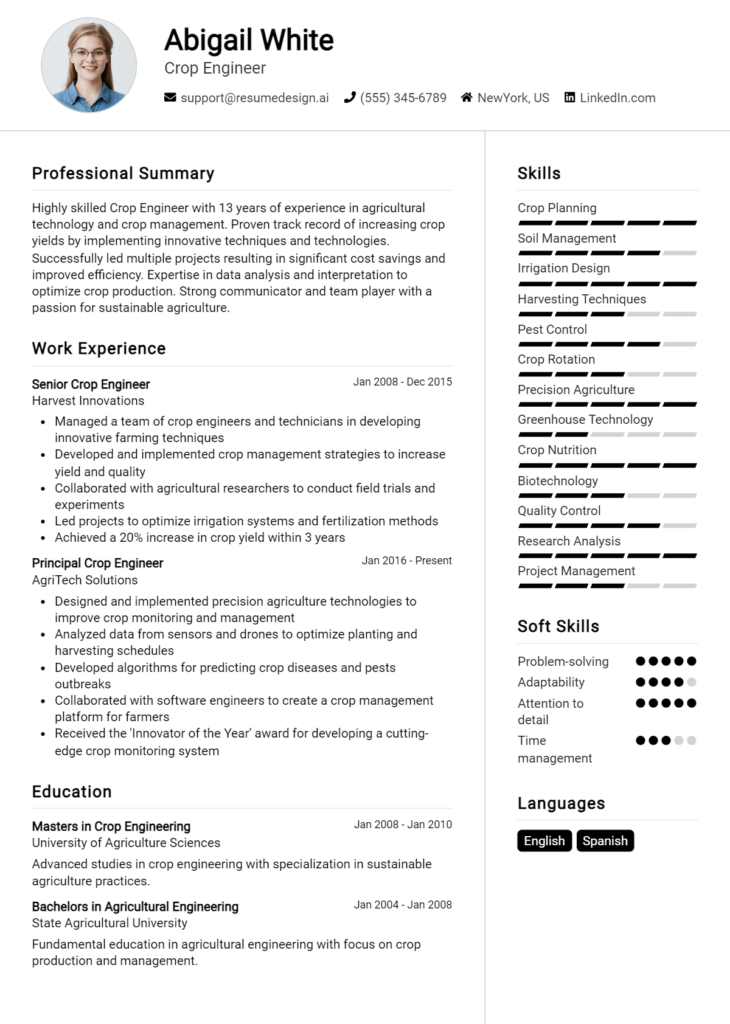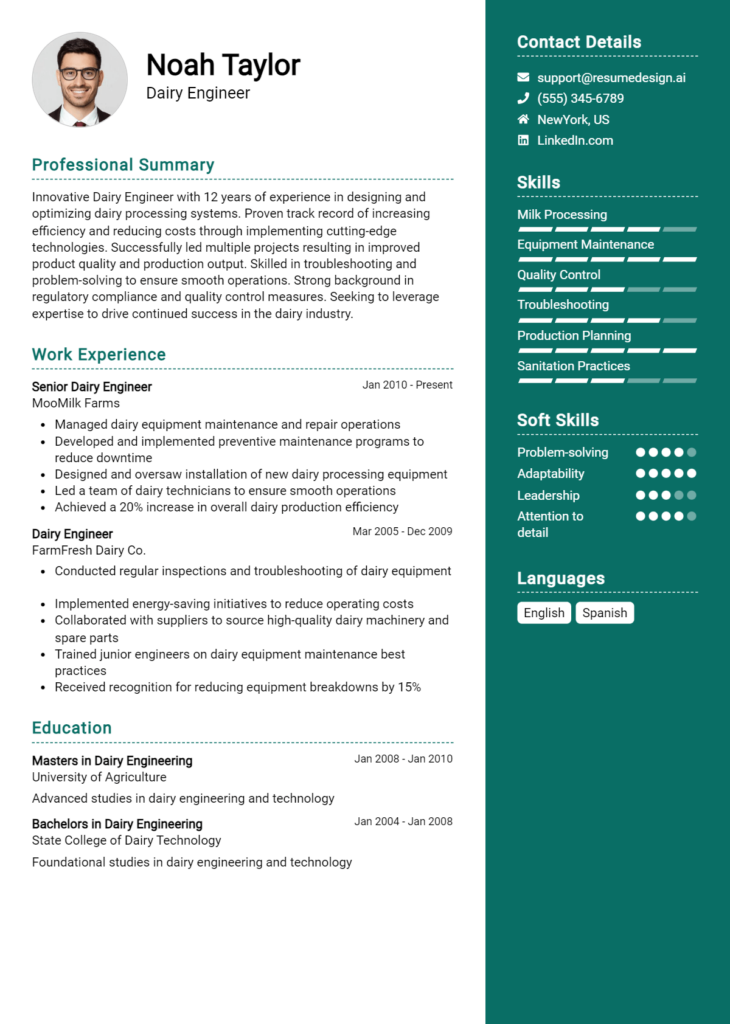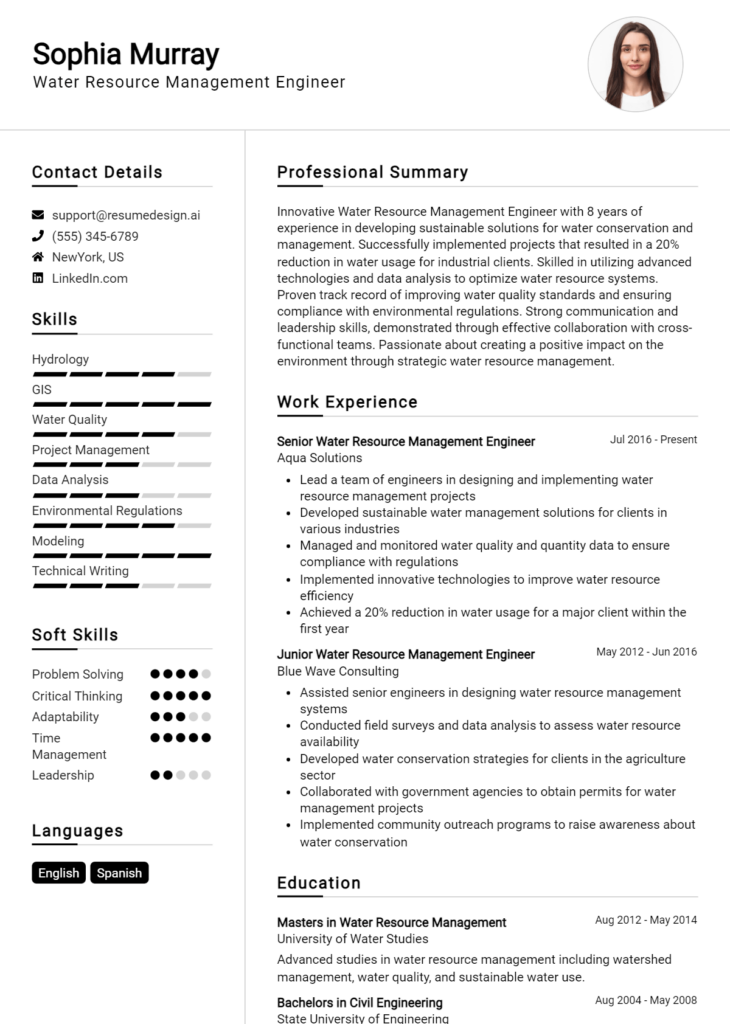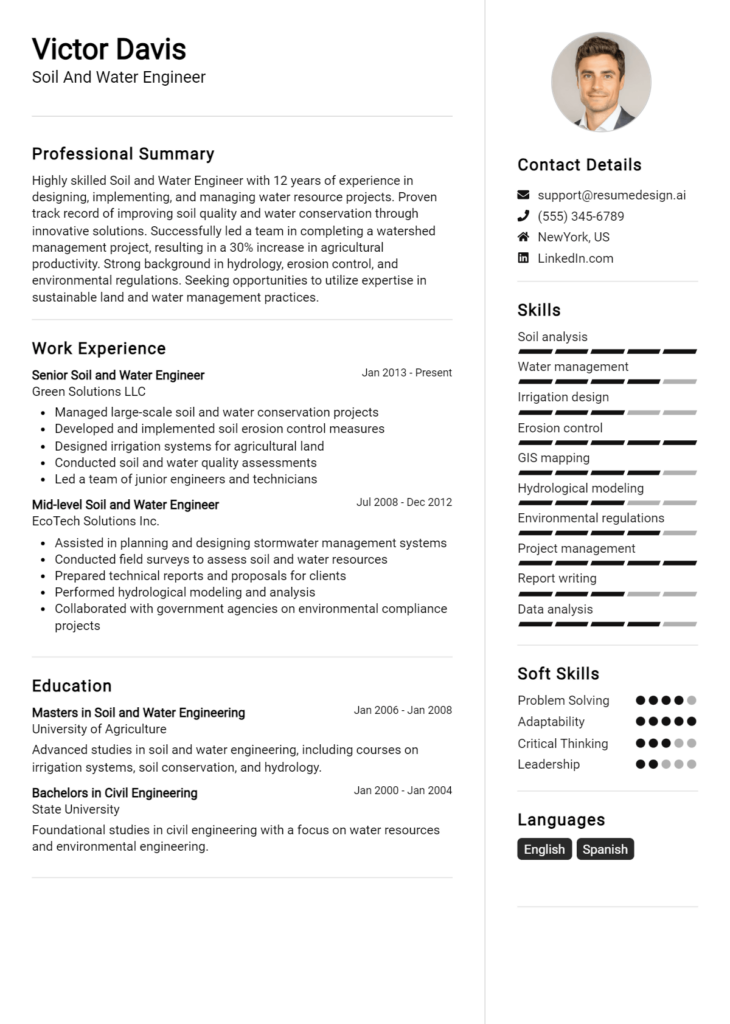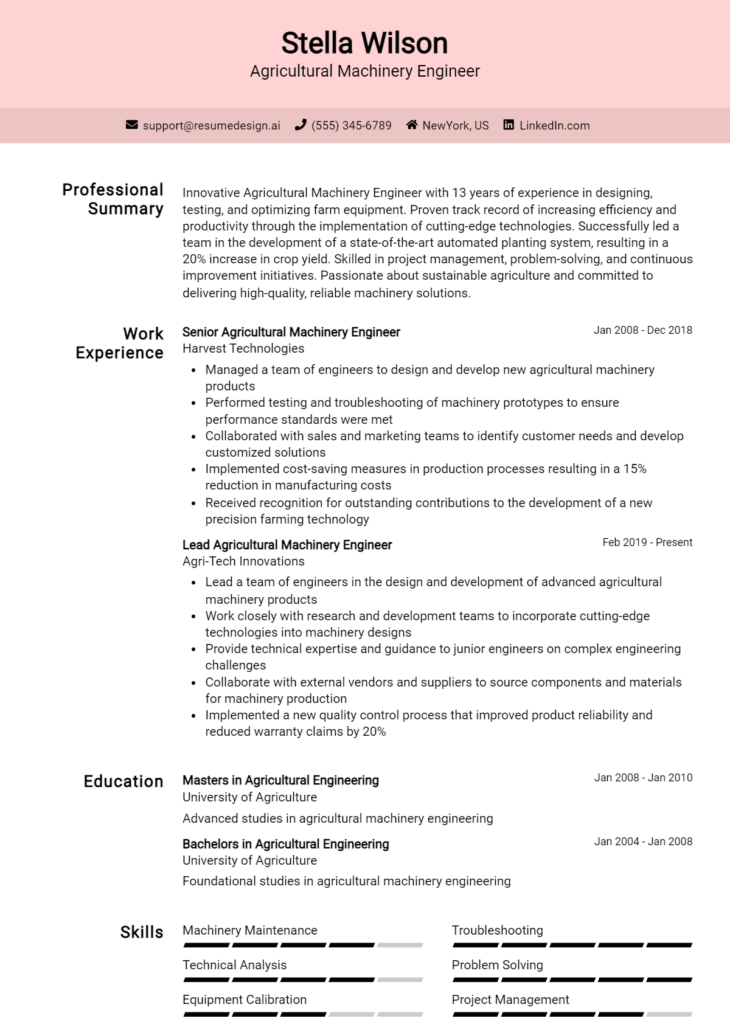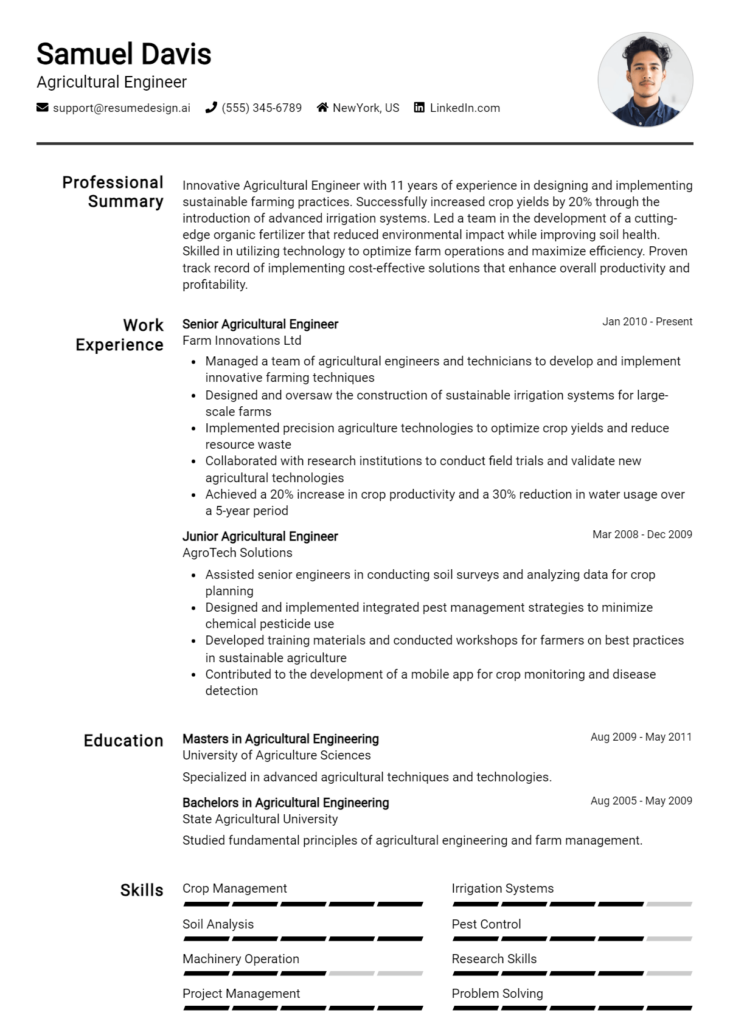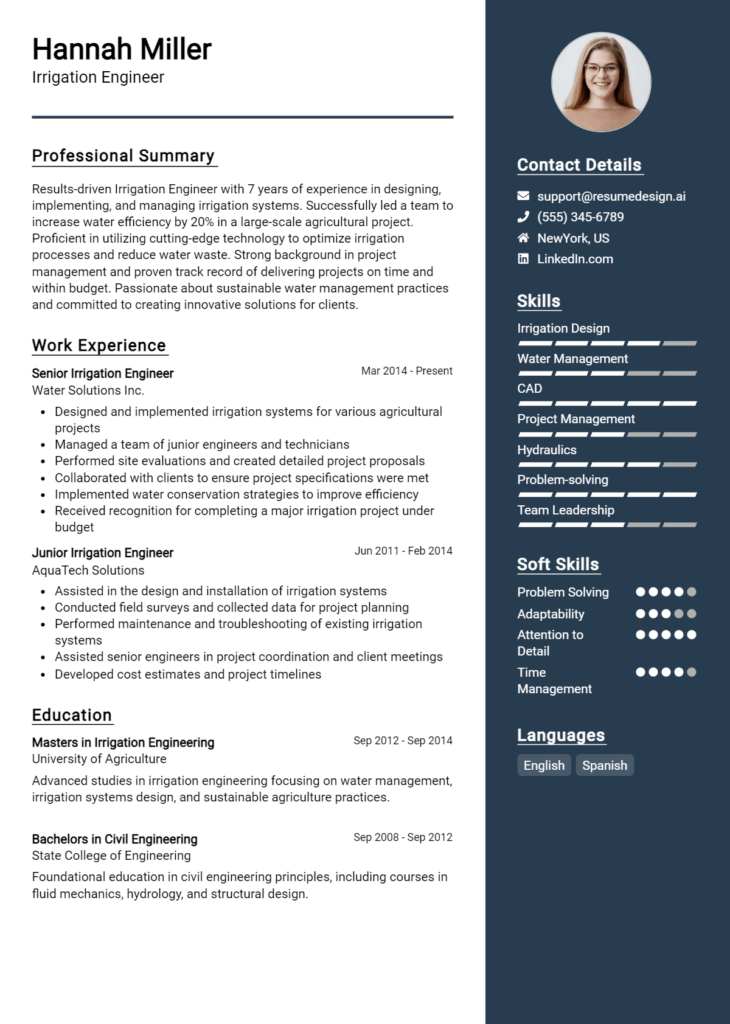Postharvest Engineer Core Responsibilities
A Postharvest Engineer plays a crucial role in optimizing the handling, storage, and processing of agricultural products to enhance quality and reduce waste. This professional bridges various departments, including production, logistics, and quality assurance, requiring strong technical, operational, and problem-solving skills. Their ability to analyze systems and implement effective solutions directly contributes to an organization's efficiency and sustainability goals. A well-structured resume can effectively showcase these qualifications, highlighting the candidate's impact on organizational success.
Common Responsibilities Listed on Postharvest Engineer Resume
- Design and implement postharvest handling systems for agricultural products.
- Conduct research to improve storage techniques and shelf-life of commodities.
- Analyze the impact of environmental factors on product quality.
- Collaborate with cross-functional teams to ensure efficient workflow.
- Develop quality control protocols and standards for postharvest processes.
- Monitor and evaluate the performance of postharvest technologies.
- Provide technical support to operational staff and management.
- Implement sustainable practices in postharvest operations.
- Train staff on best practices for handling and storage.
- Prepare reports and presentations on postharvest research findings.
- Stay updated on industry trends and advancements in postharvest technology.
High-Level Resume Tips for Postharvest Engineer Professionals
In the competitive field of postharvest engineering, a well-crafted resume is crucial for standing out among a pool of qualified candidates. Your resume often serves as the first impression you make on potential employers, and it must effectively showcase your skills, achievements, and relevant experience. A strong resume not only highlights your technical expertise but also communicates your understanding of industry challenges and innovations. This guide will provide practical and actionable resume tips specifically tailored for Postharvest Engineer professionals, helping you create a document that reflects your qualifications and enhances your chances of securing an interview.
Top Resume Tips for Postharvest Engineer Professionals
- Tailor your resume for each job application by aligning your skills and experiences with the job description.
- Highlight relevant postharvest engineering experience, including internships, projects, or previous employment in the field.
- Quantify your achievements, using metrics such as percentage improvements in yield, cost savings, or efficiency gains.
- Showcase industry-specific skills, such as knowledge of preservation techniques, quality control processes, or supply chain management.
- Incorporate keywords from the job posting to optimize your resume for Applicant Tracking Systems (ATS).
- Include professional certifications or training relevant to postharvest engineering, such as food safety or agricultural engineering credentials.
- Utilize a clean and professional format, ensuring that your resume is easy to read and visually appealing.
- Convey your passion for sustainability and innovation in postharvest practices, demonstrating your commitment to the field.
- List relevant software proficiencies, such as data analysis tools or agricultural management software that you are familiar with.
- Remember to include a concise summary or objective statement that captures your career goals and what you bring to the role.
By implementing these tips, you can significantly enhance your resume, making it a powerful tool for landing a job in the postharvest engineering field. A targeted and well-structured resume will not only attract the attention of hiring managers but also effectively communicate your qualifications and readiness to contribute to their organization.
Why Resume Headlines & Titles are Important for Postharvest Engineer
In the competitive field of postharvest engineering, crafting an effective resume headline or title is crucial for standing out to hiring managers. A strong headline serves as a powerful first impression, succinctly summarizing a candidate's key qualifications and expertise in a single impactful phrase. This not only captures the attention of recruiters but also ensures that the candidate’s most relevant skills and experiences are immediately visible. A well-crafted headline should be concise, directly related to the postharvest engineering role being applied for, and tailored to highlight the candidate's unique strengths.
Best Practices for Crafting Resume Headlines for Postharvest Engineer
- Keep it concise and to the point, ideally under 10 words.
- Use role-specific keywords that align with the job description.
- Highlight your most impressive accomplishments or skills.
- Avoid jargon or overly technical terms that may confuse readers.
- Make it relevant to the position you are applying for.
- Consider including quantifiable metrics to showcase achievements.
- Tailor your headline for each application to match the job requirements.
- Use strong action words that convey confidence and expertise.
Example Resume Headlines for Postharvest Engineer
Strong Resume Headlines
Innovative Postharvest Engineer with 10+ Years in Food Preservation
Results-Driven Engineer Specializing in Sustainable Packaging Solutions
Expert in Quality Control and Supply Chain Optimization for Fresh Produce
Dynamic Postharvest Specialist with Proven Track Record in Minimizing Waste
Weak Resume Headlines
Engineer Looking for Opportunities
Postharvest Engineer with Experience
Hardworking Individual Seeking Job
The strong resume headlines are effective because they provide clear, specific information about the candidate's expertise and accomplishments, immediately communicating value to potential employers. In contrast, the weak headlines fail to impress due to their vagueness and lack of detail, making it difficult for hiring managers to ascertain the candidate's qualifications or distinguish them from other applicants. By opting for compelling and targeted language, job seekers can significantly enhance their chances of catching the eye of recruiters in the postharvest engineering field.
Writing an Exceptional Postharvest Engineer Resume Summary
A resume summary is a critical component for a Postharvest Engineer as it serves as the first impression on hiring managers, succinctly encapsulating a candidate's qualifications and suitability for the role. A well-crafted summary quickly captures attention by highlighting key skills, relevant experience, and notable accomplishments, allowing employers to assess a candidate's potential fit for their organization. This concise yet impactful section should be tailored specifically to the job being applied for, ensuring that it resonates with the needs of the employer and sets the stage for the rest of the resume.
Best Practices for Writing a Postharvest Engineer Resume Summary
- Quantify Achievements: Use numbers and percentages to demonstrate the impact of your work.
- Focus on Relevant Skills: Highlight technical skills and expertise directly related to postharvest engineering.
- Tailor for the Job Description: Customize your summary to align with the specific requirements and keywords in the job posting.
- Be Concise: Aim for 3-5 sentences that deliver maximum impact without unnecessary details.
- Use Action Verbs: Start sentences with dynamic verbs to convey a sense of proactivity and engagement.
- Highlight Industry Knowledge: Mention familiarity with industry standards and best practices in postharvest management.
- Showcase Problem-Solving Skills: Emphasize your ability to overcome challenges and improve processes in postharvest handling.
- Include Soft Skills: Don't forget to mention interpersonal skills such as teamwork and communication that are vital in collaborative environments.
Example Postharvest Engineer Resume Summaries
Strong Resume Summaries
Results-driven Postharvest Engineer with over 7 years of experience in optimizing storage and transportation methods, achieving a 30% reduction in spoilage rates through innovative cooling technologies and process improvements.
Dedicated Postharvest Engineer skilled in implementing quality control measures, leading to a 25% increase in product shelf-life and a 15% boost in customer satisfaction ratings at XYZ Corp.
Proficient in postharvest handling and logistics, with a proven track record of managing projects that reduced operational costs by 20% while enhancing product quality through sustainable practices.
Weak Resume Summaries
Experienced engineer looking for opportunities in postharvest technology.
Knowledgeable in various engineering principles and seeking a role in the agricultural sector.
The examples of strong resume summaries are considered effective because they provide specific, quantifiable outcomes that demonstrate the candidate's impact on previous positions, along with relevant skills and industry knowledge. In contrast, the weak summaries lack detail and specificity, failing to convey how the candidate's experiences align with the role of a Postharvest Engineer, making it difficult for hiring managers to see their potential value.
Work Experience Section for Postharvest Engineer Resume
The work experience section of a Postharvest Engineer resume plays a crucial role in showcasing the candidate's technical skills, leadership capabilities, and commitment to delivering high-quality products. This section not only highlights relevant industry experience but also emphasizes the candidate's ability to manage teams effectively and implement innovative solutions that enhance postharvest processes. By quantifying achievements and aligning their experiences with industry standards, candidates can demonstrate their value to potential employers and set themselves apart in a competitive job market.
Best Practices for Postharvest Engineer Work Experience
- Use specific, quantifiable metrics to showcase successful projects, such as percentage reductions in spoilage rates or cost savings achieved.
- Highlight technical skills relevant to postharvest engineering, such as quality control, storage optimization, and process design.
- Emphasize collaboration with cross-functional teams, including farmers, supply chain managers, and quality assurance personnel.
- Incorporate industry-standard terminology and practices to align your experience with employer expectations.
- Detail leadership roles and responsibilities, showcasing how you guided teams to achieve project goals.
- Demonstrate continuous improvement initiatives and innovative solutions implemented in past roles.
- Customize your experiences to match the job description, ensuring relevance to the desired position.
- Include any certifications or training that enhance your qualifications and demonstrate ongoing professional development.
Example Work Experiences for Postharvest Engineer
Strong Experiences
- Led a team of five engineers in the redesign of a cold storage facility, resulting in a 20% increase in energy efficiency and a 15% reduction in spoilage rates.
- Implemented a quality control system that decreased postharvest losses by 25%, improving the overall profitability of the operation.
- Collaborated with local farmers to develop best practices for harvest timing and handling, which enhanced product quality and extended shelf life by an average of 10 days.
- Managed a cross-departmental team to optimize the supply chain process, achieving a 30% reduction in transportation costs while maintaining product integrity.
Weak Experiences
- Worked on various postharvest projects.
- Assisted in some quality checks and helped improve processes.
- Participated in team meetings regarding storage methods.
- Engaged in postharvest activities that were beneficial.
The examples considered strong effectively highlight quantifiable outcomes, technical leadership, and collaboration, showcasing the candidate's direct contributions and impact on the organization. In contrast, the weak experiences lack specificity and measurable results, making them less compelling and failing to demonstrate the candidate's true capabilities and achievements in the field of postharvest engineering.
Education and Certifications Section for Postharvest Engineer Resume
The education and certifications section of a Postharvest Engineer resume plays a crucial role in establishing a candidate's qualifications and expertise in the field. This segment not only showcases the individual's academic background but also emphasizes industry-relevant certifications and a commitment to continuous learning. By including pertinent coursework, certifications, and specialized training, candidates can significantly bolster their credibility and demonstrate their alignment with the specific requirements of the job role. This section serves to assure potential employers that the candidate possesses the necessary knowledge and skills to excel in postharvest engineering.
Best Practices for Postharvest Engineer Education and Certifications
- Include degrees in relevant fields such as Agricultural Engineering, Food Science, or Horticulture.
- List industry-recognized certifications, such as Certified Crop Advisor or Postharvest Technology Certificate.
- Highlight any specialized training in areas like cold chain management or quality control methodologies.
- Provide details on relevant coursework that directly relates to postharvest processes and technologies.
- Emphasize ongoing education efforts, such as workshops, seminars, or online courses.
- Ensure that the information is presented in reverse chronological order, starting with the most recent qualifications.
- Use clear and concise language to describe each certification and its relevance to postharvest engineering.
- Avoid including irrelevant degrees or certifications that do not support the role of a Postharvest Engineer.
Example Education and Certifications for Postharvest Engineer
Strong Examples
- B.S. in Agricultural Engineering, University of California, Davis
- Certified Postharvest Technology Specialist, Postharvest Technology Center
- Coursework in Food Preservation and Quality Assurance, Penn State University
- Advanced Training in Cold Chain Management, International Society for Horticultural Science
Weak Examples
- B.A. in English Literature, University of Michigan
- Certification in Basic First Aid, American Red Cross
- Coursework in Environmental Science with no focus on agriculture
- Outdated certification in Food Handling from 2005
The strong examples are considered effective because they directly align with the responsibilities and skills required for a Postharvest Engineer, showcasing relevant education and specialized training that enhance the candidate's qualifications. In contrast, the weak examples illustrate a lack of relevance to the field, with degrees and certifications that do not contribute to the competencies necessary for success in postharvest engineering. This distinction underscores the importance of tailoring educational qualifications to the specific demands of the job role.
Top Skills & Keywords for Postharvest Engineer Resume
As a Postharvest Engineer, possessing the right blend of skills is crucial not only for crafting an effective resume but also for excelling in the field. These professionals play a vital role in ensuring that agricultural products maintain their quality and safety from the moment they are harvested until they reach consumers. A well-structured resume highlighting relevant skills can significantly enhance a candidate's chances of landing a job in this competitive field. By demonstrating both hard and soft skills, candidates can showcase their technical expertise and interpersonal abilities, which are essential for collaboration and problem-solving in postharvest operations.
Top Hard & Soft Skills for Postharvest Engineer
Soft Skills
- Communication
- Problem-solving
- Teamwork
- Critical thinking
- Adaptability
- Attention to detail
- Time management
- Leadership
- Creativity
- Customer service orientation
- Conflict resolution
- Decision-making
- Collaboration
- Interpersonal skills
- Negotiation
- Project management
Hard Skills
- Knowledge of postharvest technology
- Quality control techniques
- Data analysis
- Familiarity with storage systems
- Experience with preservation methods
- Understanding of food safety regulations
- Proficiency in laboratory techniques
- Equipment maintenance and troubleshooting
- Process optimization
- Familiarity with agricultural practices
- Research and development skills
- Statistical analysis
- Computer-aided design (CAD) software
- Knowledge of supply chain management
- Experience with environmental control systems
- Proficiency in data management software
- Modeling and simulation techniques
For further insights on how to effectively present your skills and work experience, consider exploring additional resources that can guide you in tailoring your resume to meet the demands of this important role.
Stand Out with a Winning Postharvest Engineer Cover Letter
As a dedicated Postharvest Engineer with a strong background in agricultural technology and a passion for enhancing food preservation methods, I am excited to apply for the position at [Company Name]. With a master's degree in Agricultural Engineering and over five years of hands-on experience in postharvest management, I have developed a robust skill set that aligns perfectly with your organization's commitment to reducing food waste and improving supply chain efficiency. My expertise in designing innovative storage solutions and implementing sustainable practices has consistently resulted in extended shelf life and improved quality of perishable goods.
In my previous role at [Previous Company Name], I successfully led a project that redesigned the cooling system for our fresh produce storage, which reduced spoilage rates by 30% within the first year. My approach combines scientific principles with practical applications, allowing me to optimize storage conditions and utilize technology to monitor and control environmental factors. Additionally, collaborating with cross-functional teams to develop training programs for farmers on best practices in postharvest handling has empowered them to maintain product quality and maximize profitability.
I am particularly drawn to [Company Name] because of its innovative approach to tackling food waste and commitment to sustainability. I am eager to bring my experience in developing cost-effective postharvest solutions and my proactive attitude toward research and development to your team. I am confident that my ability to analyze data and implement actionable strategies will contribute to your mission of enhancing food security and minimizing environmental impact.
Thank you for considering my application. I look forward to the opportunity to discuss how my background, skills, and enthusiasm can align with the strategic goals of [Company Name]. I am excited about the possibility of contributing to your team and making a positive impact in the field of postharvest engineering.
Common Mistakes to Avoid in a Postharvest Engineer Resume
When crafting a resume for a Postharvest Engineer position, it's essential to present your skills and experiences effectively. However, many candidates make common mistakes that can hinder their chances of landing an interview. Recognizing and avoiding these pitfalls can significantly enhance the impact of your resume. Here are some frequent errors to watch out for:
Vague Job Descriptions: Failing to provide specific details about previous roles can leave hiring managers unclear about your actual responsibilities and achievements. Use quantifiable results to demonstrate your impact.
Lack of Relevant Keywords: Neglecting to include industry-specific terminology may cause your resume to be overlooked by applicant tracking systems (ATS). Use keywords from the job description to align your qualifications with the role.
Ignoring Technical Skills: Postharvest engineering often involves specialized knowledge in areas such as food preservation, quality control, and logistics. Omitting these technical skills can make it difficult for employers to gauge your expertise.
Overly Complex Language: Using jargon or overly technical language can alienate hiring managers who may not have a deep understanding of your field. Aim for clarity and simplicity to ensure your accomplishments are easily understandable.
Not Tailoring the Resume: Sending out a generic resume for every application can diminish your chances. Customize your resume for each position by highlighting specific experiences and skills that match the job requirements.
Inconsistent Formatting: A cluttered or inconsistent resume can be distracting and unprofessional. Use a clean, uniform format with clear headings and bullet points to enhance readability.
Excessive Length: Providing too much information can overwhelm the reader. Aim for a concise resume, ideally one page, focusing on the most relevant experiences and accomplishments.
Neglecting Soft Skills: While technical skills are crucial, overlooking soft skills like teamwork, communication, and problem-solving can be detrimental. Highlighting these abilities can help showcase your overall fit for the role.
Conclusion
As a Postharvest Engineer, it's essential to understand the critical role you play in ensuring the quality and safety of agricultural products after harvest. Your expertise in designing and implementing efficient postharvest systems significantly impacts food preservation, waste reduction, and overall supply chain efficiency.
In this article, we've explored the various responsibilities of a Postharvest Engineer, including the development of storage solutions, the application of innovative preservation technologies, and the importance of monitoring environmental conditions. We also highlighted the need for collaboration with farmers, food scientists, and logistics experts to optimize processes and enhance product quality.
With the demand for skilled professionals in this field continually growing, it's crucial to present yourself effectively through a well-crafted resume. A strong resume not only showcases your technical skills and experience but also reflects your understanding of industry challenges and solutions.
Now is the perfect time to review your Postharvest Engineer resume to ensure it aligns with industry standards and highlights your unique qualifications. Consider utilizing available resources to enhance your application materials, such as resume templates, a resume builder, resume examples, and cover letter templates.
Take action today and make your resume stand out in this competitive field!

